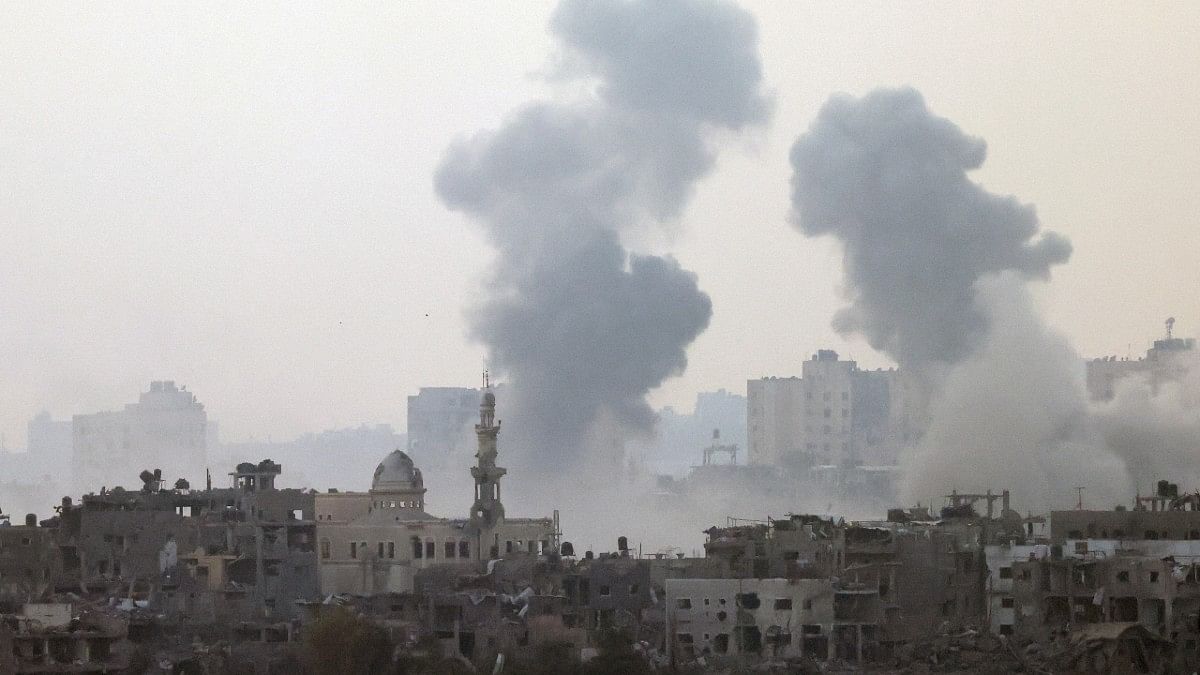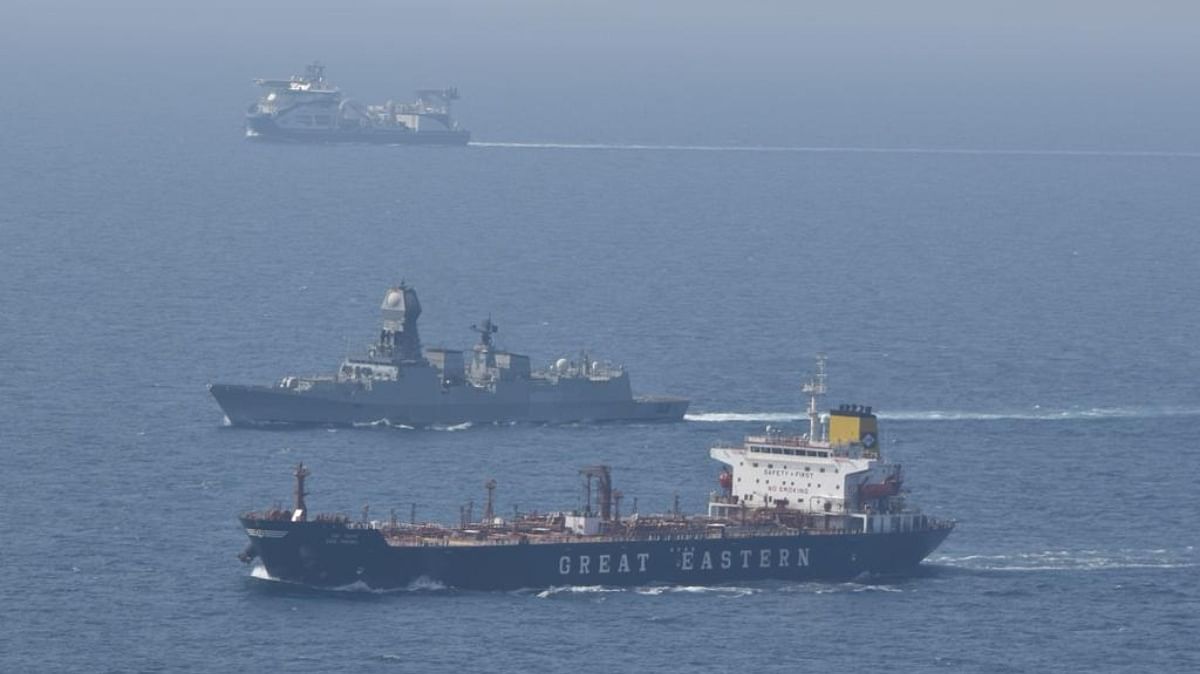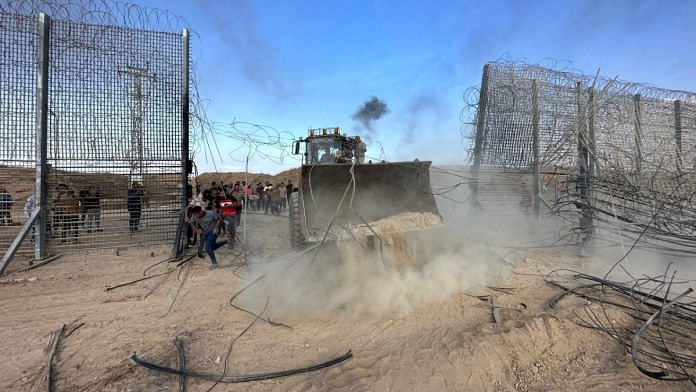New Delhi: The mood in Israel was festive on the weekend beginning 7 October 2023.
The weeklong harvest festival of Sukkot had concluded the day before, and practising Jews were in the midst of observing the sabbath, a weekly day of prayer and rest in Judaism where all kinds of work is forbidden.
To the country’s south, in an area bordering the besieged Gaza Strip, revellers from different parts of the world had spent the night drinking and dancing at a music festival held with the message of peace and love.
However, just as the Sun rose that Saturday, air sirens rent the air across Israel’s southern communities — terrorists from the Palestinian group Hamas had not just breached Israel’s sophisticated border fence, but entered Israeli territory paragliding to wage an attack of relentless barbarity.
Families, including children and the elderly, were killed in their homes, and the revellers at the festival shot down. Over 200 Israelis were taken hostage, of whom nearly 100 are yet to return.
Soon afterwards, Israel officially declared war on Gaza.
It’s been 100 days since, and the hostilities are no close to ceasing despite a rising body count — while Israeli estimates suggest that over 1,200 people, mostly civilians, were killed on 7 October, an estimated 23,357 Gazans, comprising 1 percent of the enclave’s population, have been killed in the ensuing onslaught, according to figures released by local authorities in the enclave.
In this war of the social media era, its brutality has been seen across the world, including through grisly visuals of babies and children killed on both sides — of a woman’s mutilated corpse being paraded on the road, and parents clutching the lifeless bodies of dead infants.
The reverberations of the war have been felt on the campuses of premier universities in the US, a close Israel ally, and its consequences are expected to be a factor in this year’s US presidential election.
Last week, the International Court of Justice started hearing a case filed by South Africa accusing Israel of carrying out genocide in Gaza, allegations Israel has dismissed while vowing to continue its offensive until it achieves victory over Hamas.
A 7-day truce was brokered by Egypt and Qatar in November last year, but Israel has since rejected constant calls for a ceasefire since. In December, the US, the most powerful backer of Israel, asked it to scale back its ground and air offensive, in favour of a more targeted offensive.
Observers following the war say they don’t see the conflict ending anytime soon.
As things stand, the war is being fought on multiple fronts, with Lebanon’s Hezbollah and Yemen’s Houthis, both backed by Iran, joining the war on Hamas’ side.
Over the past few weeks, the Houthis have been targeting commercial ships in the Red Sea, including those bound for India, leading many shipping companies to suspend operations in the region.
While the US and allies have launched strikes in light of the attacks, the Indian Navy has deployed vessels in the Arabian Sea for deterrence.
This war is among the bloodiest iterations of the Israel-Palestine conflict since it first erupted in the 20th century, with the campaign to establish a Jewish homeland — now Israel — in Palestine.
Also Read: Israel isn’t the first to violate laws of war. But we owe Gaza an experiment in negotiations
House-to-house battle in Gaza
In its air strikes, Israel has used precision-guided weapons launched using fighter jets.
The IDF’s airstrikes against Gaza were only a start, “part of a campaign to prepare the ground for invasion”, Maj. Nir Dinar, an Israeli military spokesperson, was quoted as saying by the New York Times in October.
According to Dinar, the aim was to destroy the tunnels — used by Hamas personnel for various purposes, including transporting weapons and springing attacks — and “kill as many terrorists from the air as possible”.

Towards the end of October, Israel launched a combined-arms attack on Gaza, which included land incursions, bombs as well as an information blackout.
According to a CBS News report, Israel initiated a new phase of its war on Hamas by carrying out elaborate ground attacks using artillery fire.
Towards the end of October, Al Jazeera reported, the Israeli military released footage of night-time incursions in Gaza, saying they were “in preparation for the next stages of combat”.
Israeli Defence Minister Yoav Gallant, according to the report, said that his forces were precisely targeting the tunnels that had become safe spaces for the Hamas fighters.
By the end of the year, Israel had extended ground attacks into southern Gaza after starting from the north, and then into central Gaza refugee camps.
Israel and Hamas are now fighting a house-to-house battle in Gaza.
Several Hamas commanders have been killed in the war.
In November last year, Hamas’ military wing — Al-Qassam Brigades — said that four of its leaders were killed during Israeli attacks.
On 1 January, Israel killed Adel Mesmah, the commander of the Hamas’ Najaba company of Deir al-Balah in central Gaza, in an airstrike.
Two days later, deputy leader Saleh al-Arouri was killed in a suspected Israeli drone strike in Beirut, Lebanon. Hezbollah subsequently said the killing will not go unpunished, and went on to claim a strike on a group of soldiers inside Israeli territory.
Middle-East expert Anant Mishra, a visiting fellow at the International Centre for Policing and Security, University of South Wales, said the exact numbers of Hamas commanders killed is not known, but “Tel Aviv claims the figure to be more than Washington”.
On Sunday, an anti-tank missile fired by Hezbollah killed two people inside a home in an Israeli border community. The Israeli military has vowed to hit back.
The same day, the IDF said the Israeli air force had completed “a wave of attacks on Lebanese territory”, saying the targets included “terrorist infrastructures and operational headquarters of the terrorist organisation Hezbollah”.
Also Read: What, when, where, why & how of the Israel-Hamas war
Israel-US shifting ties?
While many allies supported Israel’s right to defend in the early days of the war, Tel Aviv’s military offensive in Gaza has stoked growing concerns about its conduct in the war.
The latest incident that has sparked worry about the Israeli Defense Forces (IDF) resorting to indiscriminate violence came last month when three Israeli hostages in Hamas custody were shot dead despite waving white flags and pleading for help in Hebrew.
Adding to concerns about the nature of Israel’s offensive are statements made by two ministers suggesting resettling of Gazans outside the enclave, and re-establishing Jewish presence in the enclave (Israel withdrew troops and civilians from Gaza in 2005).
Israel, currently led by a government seen as its most Right-wing administration ever, has largely been backed by the US and Europe in the war.

However, Washington has been toughening its stance amid reports of growing fatalities in Israel’s carpet-bombing of Gaza.
On his latest visit to the Arab region, last week, US Secretary of State Antony Blinken was reportedly warned by leaders of the Middle-East about growing anti-US opinion over its support for Israel.
Last month, US President Joe Biden said Israel was losing international support over its “indiscriminate bombing” of Gaza, and the State Department issued unequivocal condemnation of the Israeli ministers’ statements on resettling Gaza.
Within the European Union, European Commission President Ursula von der Leyen, who sought to highlight Europe’s “unequivocal” support for Israel, has come under criticism from top EU diplomat Josep Borrell.
Meanwhile, Spain’s Social Rights Minister Ione Belarra has denounced Israel’s “planned genocide in the Gaza strip”.
Last month, India supported a UN General Assembly resolution backing an immediate humanitarian ceasefire in Gaza, after abstaining from an earlier resolution calling for the same.
Israel’s actions in Gaza have also led many countries, including Turkey, South Africa, Bahrain and Chile, to sever ties with the country.
However, speaking to ThePrint, Kabir Taneja, a fellow at the Observer Research Foundation (ORF), said that “barring public perception, Israel’s ties with the West have remained unchanged”.
“US and European allies continue to support the fundamentals behind the war,” he added, saying “Israel is not concerned with global perceptions right now”.
“Its main priority is to restore a sense of security for its citizens,” he added.
Taneja said the fact that this is an election year in the US may play into the Biden administration’s stand on the war.
“While US-Israel ties remain stable, there have been calls made against conservative Israeli politicians’ problematic comments. Given this is an election year for the US, we might see some signaling from Washington to Tel Aviv to stop the carpet-bombing and instead focus on targeted campaigns,” he added.
Since Biden pledged American support for Israel in the war, his popularity among voters has reportedly declined — according to a New York Times/Siena College poll held last month, 57 per cent of voters disapproved of the way Biden is handling the war, with 46 per cent saying they would trust former US President Donald Trump to do a better job.
Also Read: India-Pakistan can become Israel-Hamas. Lesson is not to fight terrorism by force alone
Shadow over global trade
Last month, the Israel-Hamas war hit close to home, when two India-bound ships came under attack in the Red Sea and the Arabian Sea.
This came amid a wave of attacks on commercial ships that have been attributed to the Houthis. Until last week, the rebels had launched attacks on over 25 merchant vessels passing through the southern Red Sea and Gulf of Aden.
This has resulted in major shipping companies such as Denmark’s Maersk, France’s CMA CGM, Taiwan’s Evergreen, China’s state-owned COSCO, among others, suspending operations in the Red Sea, and rerouting around the Cape of Good Hope, which makes trade not just costlier but more time-consuming.

The Red Sea is a crucial shipping route for the world, as it provides access to the Suez Canal, the most direct maritime link between Europe and Asia. Roughly 12 percent of all global trade, worth over $1 trillion, passes through this canal annually.
A large number of Indian commodities, including steel, engineering goods, textiles, chemicals, vehicles, and agro-products, are exported to Europe and the West, through the Red Sea.
According to Delhi-based research body, Research and Information System for Developing Countries, there has been an estimated 6.7 percent drop in Indian exports in this fiscal year due to these attacks, worth $30 billion.
Mishra said the “Yemeni Houthis, backed by Iran, have launched missiles and drone attacks on commercial shipping in the Red Sea”. “They have also got ballistic missile capability,” he added.
As a result of the attacks, the Indian Navy has enhanced surveillance by deploying task groups comprising destroyers and frigates in the Arabian Sea along with remotely piloted aircraft (RPA).
On 5 January, the Navy responded swiftly to a hijacking incident in the Arabian Sea on board a Liberian-flagged bulk carrier. The navy diverted the mission-deployed INS Chennai to rescue the 21 crew members, including 15 Indians, on board.
Last month, Washington announced the Operation Prosperity Guardian (OPG), a US Navy-led coalition focusing on security in the Red Sea meant to allow international shipping to safely pass through the region.
The US Defence Secretary Lloyd J. Austin announced several nations, including the UK, Bahrain, Canada and France, would join the alliance, but there is no clarity on the nations participating in this endeavour, with some countries denying they are a part of it.
In the initial days, Singh said, the OPG “was aimed at escorting ships safely through the Red Sea, [but] this is no longer the case”.
“Now the operation has moved towards engaging in more active combat operations,” he added.
In what has been seen as an expansion of the conflict, the US and some of its allies, including the UK, have been conducting air and naval strikes on Houthi targets in Yemen.
Meanwhile, the US along with the UK, Australia, Bahrain, Canada and the Netherlands have carried out military strikes on Houthi targets in Yemen.
In a statement on 11 January, the US Central Command — which covers the “‘central’ area of the globe located between the European, Africa and Indo-Pacific Commands” and whose priorities include “deterring Iran” — said its “forces, in coordination with the United Kingdom, and support from Australia, Canada, the Netherlands, and Bahrain conducted joint strikes on Houthi targets to degrade their capability to continue their illegal and reckless attacks on US and international vessels and commercial shipping in the Red Sea”.
Since 17 October 2023, it added, the Houthis have “attempted to attack and harass 27 ships in international shipping lanes”.
Taneja said the West’s strikes in the region will be of little consequence. “The Houthi rebels’ attacks on commercial vessels twisted the West’s arms. However, these strikes are unlikely to have a long-term impact on the Houthis. Air campaigns are usually more for signaling and will not provide much deterrence in this case,” he added.
He said the Houthis, by aligning with the Palestinian cause, are gaining sympathy in the Middle East.
However, Mishra said the Houthis have “come under extreme international pressure, which would diminish their ability to go for widespread global attention and, at some point of time, they will not be able to reap domestic benefits which they were getting through enhanced popular support”.
He said the situation will only get worse, adding that the dynamics between Israel and Lebanon, the role of Houthis in the Red Sea, Iraq and Syria are spillover contestations, starting from Gaza.
“It is my prediction that in a couple of weeks from now, there is going to be a violent spike in these areas, which could result in an escalation to a wider confrontation,” he added.
Meanwhile, Abhijit Singh, senior fellow at the Maritime Policy Initiative at ORF and a former official in the executive Branch of the Indian Navy, said the suspension of shipping operations in the affected areas “will have a significant impact — adding roughly two weeks to commute time as ships will now have go around the Cape of Good Hope, increase in expenses and insurance as well as affect energy and oil prices in the long-term”.
This is an updated version of the report
(Edited by Sunanda Ranjan)
Also Read: Israel’s motive to eradicate Hamas is only catchy headline-making. It’s impossible



